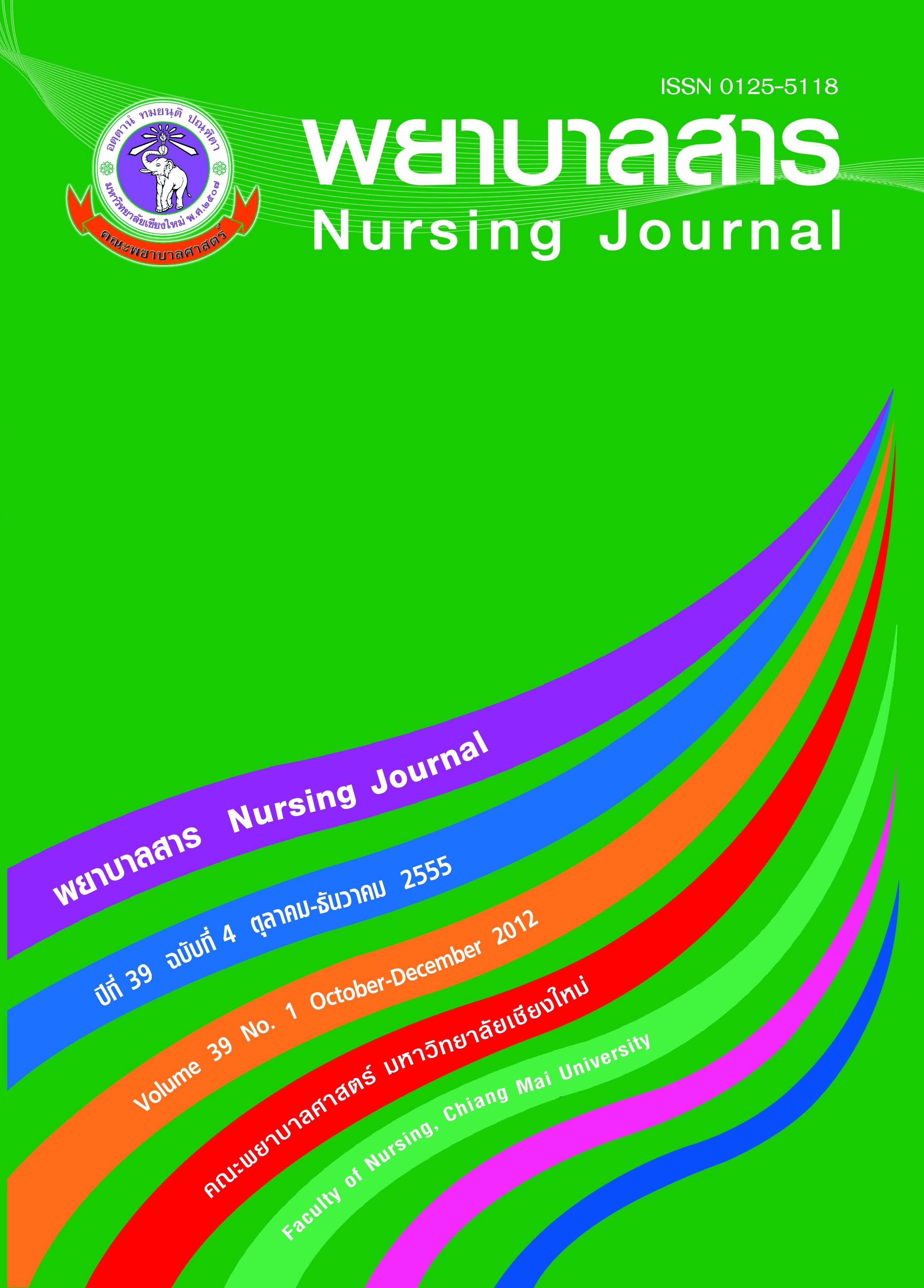ผลของการสนับสนุนทางสังคมต่อความเจ็บปวดในการคลอดและการรับรู้ประสบการณ์การคลอดของผู้คลอดวัยรุ่นครรภ์แรก
Keywords:
การสนับสนุนทางสังคม, ความเจ็บปวดในการคลอด, การรับรู้ประสบการณ์การคลอด, วัยรุ่นครรภ์แรก, ผู้คลอดวัยรุ่น, Social Support, Labor Pain, Perception of Childbirth Experience, Primiparous Adolescent, Adolescent ParturientsAbstract
บทคัดย่อ
ผู้คลอดวัยรุ่นครรภ์แรกมักรับรู้ว่าการคลอดเป็นประสบการณ์ที่เจ็บปวดซึ่งจะนำไปสู่การรับรู้ ประสบการณ์การคลอดด้านลบตามมา การสนับสนุนทางสังคมในระยะคลอดเป็นการดูแลผู้คลอดทั้ง ด้านร่างกายและจิตใจที่อาจช่วยลดความเจ็บปวดและส่งเสริมการรับรู้ประสบการณ์การคลอดทางบวก การวิจัยกึ่งทดลองครั้งนี้มีวัตถุประสงค์เพื่อศึกษาผลของการสนับสนุนทางสังคมต่อความเจ็บปวดใน การคลอดและการรับรู้ประสบการณ์การคลอดในผู้คลอดวัยรุ่นครรภ์แรก กลุ่มตัวอย่างคือผู้คลอด วัยรุ่นครรภ์แรกที่มาคลอดในหน่วยคลอดโรงพยาบาลปทุมธานี ระหว่างเดือนมิถุนายนถึงเดือนสิงหาคม พ.ศ. 2554 จำนวน 60 ราย เลือกกลุ่มตัวอย่างแบบเจาะจงแบ่งเป็นกลุ่มควบคุมและกลุ่มทดลองกลุ่ม ละเท่า ๆ กันและทั้งสองกลุ่มจับคู่ด้วยการเตรียมคลอดและการได้รับยาเร่งคลอด กลุ่มทดลองได้รับการ สนับสนุนทางสังคมในระยะเจ็บครรภ์จนถึง 2 ชั่วโมงหลังคลอด ส่วนกลุ่มควบคุมได้รับการพยาบาล ตามปกติ เครื่องมือที่ใช้ในการดำเนินการวิจัย คือ แผนการสนับสนุนทางสังคมในระยะคลอดที่ผู้วิจัย สร้างขึ้นตามแนวคิดของ เชฟเฟอร์ คอยน์และลาซารัส เครื่องมือที่ใช้ในการรวบรวมข้อมูล คือ มาตรวัด ความเจ็บปวดชนิดที่เป็นตัวเลข และแบบสัมภาษณ์การรับรู้ประสบการณ์การคลอดของ สุพิศ ณ เชียงใหม่ (2533) วิเคราะห์ข้อมูลโดยใช้สถิติพรรณนา สถิติทดสอบค่าทีชนิด 2 กลุ่มอิสระต่อกันและ สถิติทดสอบแมนวิทนีย์ยู
ผลการวิจัย พบว่า
ผู้คลอดวัยรุ่นในกลุ่มทดลองมีความเจ็บปวดในการคลอดน้อยกว่าผู้คลอดวัยรุ่นในกลุ่มควบคุม อย่างมีนัยสำคัญทางสถิติ (p=0.001) และผู้คลอดวัยรุ่นในกลุ่มทดลองรับรู้ประสบการณ์การคลอดทาง บวกมากกว่าผู้คลอดวัยรุ่นในกลุ่มควบคุมอย่างมีนัยสำคัญทางสถิติ (p < 0.001)
ผลการวิจัยนี้เสนอแนะว่าบุคลากรทางสุขภาพควรให้การสนับสนุนทางสังคมในระยะคลอดเพื่อ เป็นการเพิ่มคุณภาพการพยาบาลในการดูแลผู้คลอดวัยรุ่น
คำสำคัญ: การสนับสนุนทางสังคม ความเจ็บปวดในการคลอด การรับรู้ประสบการณ์การคลอด วัยรุ่นครรภ์แรก ผู้คลอดวัยรุ่น
Abstract
Primiparous adolescents tend to perceive childbirth as a painful experience. This feeling leads to a negative childbirth experience. Social support during labor provides both physiological and psychological care for the parturients that may relieve labor pain and promote positive childbirth experience. This quasi-experimental research aimed to examine the effects of social support on labor pain and perception of childbirth experience among primiparous adolescent parturients. The subjects were 60 primiparous adolescents admitted at the labor unit in Pathum Thani hospital between June and August 2011. The subjects were purposively selected and assigned in equal numbers into control and experimental groups, and both groups were matched by childbirth preparation and medical induction. Subjects in the experimental group received social support during labor until 2 hours after birth while subjects in control group received usual nursing care. The research instrument used was the social support plan during labor developed by the researcher based on the social support model of Schaefer, Coyne, and Lazarus (1981). Data collection tools were the numeric rating pain scale and the perception of childbirth experience interview by Na Chaingmai (1990). Data were analyzed using descriptive statistics, independent t-test and Mann Whitney U test.
The results of study
Revealed that the adolescent parturients in the experimental group had less labor pain than that of the control group (p=0.001). Moreover, the adolescent parturients in the experimental group perceived more positive childbirth experience than that of the control group (p < 0.001).
The findings of this study suggest that the healthcare providers should provide social support during childbirth to improve quality nursing care for the adolescent parturients.
Key words: Social Support, Labor Pain, Perception of Childbirth Experience, Primiparous Adolescent, Adolescent Parturients
Downloads
How to Cite
Issue
Section
License
บทความที่ได้รับการตีพิมพ์เป็นลิขสิทธิ์ของวารสารพยาบาลสาร
ข้อความที่ปรากฏในบทความแต่ละเรื่องในวารสารวิชาการเล่มนี้เป็นความคิดเห็นส่วนตัวของผู้เขียนแต่ละท่านไม่เกี่ยวข้องกับมหาวิทยาลัยเชียงใหม่ และคณาจารย์ท่านอื่นๆในมหาวิทยาลัยฯ แต่อย่างใด ความรับผิดชอบองค์ประกอบทั้งหมดของบทความแต่ละเรื่องเป็นของผู้เขียนแต่ละท่าน หากมีความผิดพลาดใด ๆ ผู้เขียนแต่ละท่านจะรับผิดชอบบทความของตนเองแต่ผู้เดียว






